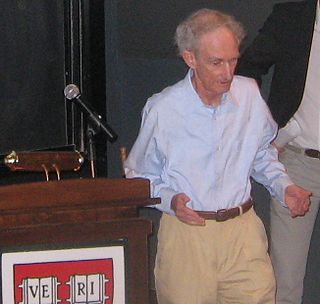A Quote by Robert May, Baron May of Oxford
In such systems, there is unquestioning respect for authority. Faith trumps evidence. But if indeed this is broadly the explanation for how co-operative behaviour has evolved and been maintained in human societies, it could be very bad news. Because although such authoritarian systems seem to be good at preserving social coherence and an orderly society, they are, by the same token, not good at adapting to change.
Quote Topics
Related Quotes
There are a few societies that show signs of having been very rational about the physics of construction and the physics of real life. Some of the old middle-Eastern societies had downdraft systems over whole cities, and passive, rapid-evaporation ice-making systems. They were rational people using good physical principles to make themselves comfortable without additional sources of energy.
This is what I say: I've got good news and bad news. The good news is, you don't have to worry, you can't change the past. The bad news is, you don't have to worry, no matter how hard you try, you can't change the past. The universe just doesn't put up with that. We aren't important enough. No one is. Even in our own lives. We're not strong enough, willful enough, skilled enough in chronodiegetic manipulation to be able to just accidentally change the entire course of anything, even ourselves.
The bad news is that the movement toward the partnership side of the social scale (and it is always a matter of degree, as no society is a pure partnership or domination system) has been fiercely resisted and countered by periodic regressions. So domination systems have rebuilt themselves in different forms - be they secular or religious, eastern or western, leftist or rightist.
Wherever we find orderly, stable systems in Nature, we find that they are hierarchically structured, for the simple reason that without such structuring of complex systems into sub-assemblies, there could be no order and stability- except the order of a dead universe filled with a uniformly distributed gas.
For any exam in history, here is the answer: all human history is the struggle between systems that attempt to shackle the human personality in the name of some intangible good on the one hand and systems that enable and expand the scope of human personality in the pursuit of extremely tangible aims. The American system is the most successful in the world because it harmonizes best with the aims and longings of human personality while allowing the best protection to other personalities.
Anarchy, when it works to destroy authority in all its aspects, when it demands the abrogation of laws and the abolition of the mechanism that serves to impose them, when it refuses all hierarchical organization and preaches free agreement - at the same time strives to maintain and enlarge the precious kernel of social customs without which no human or animal society can exist. Only, instead of demanding that those social customs should be maintained through the authority of a few, it demands it from the continued action of all.
Christianity is not about good people getting better. If anything, it is good news for bad people coping with their failure to be good. The heart of the Christian faith is Good News, not good advice, good technique, or good behavior. Too many people have walked away from the church, not because they’re walking away from Jesus, but because the church has walked away from Jesus.





































